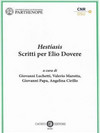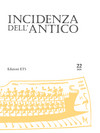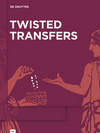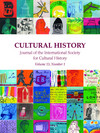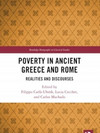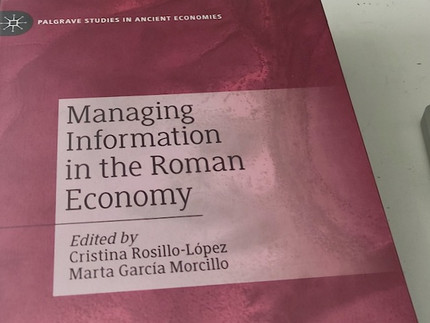Publikationen
Filippo Carlà-Uhink: Natalis, Matronianus e uno „scandalo di corruzione“ nel IV secolo d.C.. In: G. Luchetti, V. Marotta, G. Papa, A. Cirillo (Hg.), Hestíasis. Scritti per Elio Dovere, Bari 2025, 127-138.
CTh. 9, 27, 3 (382) attests the punishment inflicted on a former provincial governor, Natalis, guilty of corruption. This chapter analyses this legal text, highlighting its ostentatious and performative meaning, aimed at enhancing Theodosius I’s self-representation as well as at reinforcing the legitimacy of his imperial power.
For further information about the book and the other articles, click here.
Lucia Cecchet: Rivalry, competition and corruption in Dio Chrysostom’s Bithynian orations
Within the Twisted Transfer project, Lucia Cecchet (Università degli Studi di Milano) has published an essay in the newspaper INCIDENZA DELL'ANTICO. You can access the article in Vol. 22(2024) here.
This paper discusses some of the main ‘vices’ of Bithynian politics as they emerge from Dio Chrysostom’s Bithynian orations. It focuses on the issue of local rivalries between Bithynian poleis, the problematic relations between poleis and Roman authorities and, eventually, the difficult position of Dio in Prusa.
New publication in the ‘Twisted Transfers’ series
Corruption in the Graeco-Roman World. Re-Reading the Sources
We are pleased to announce the publication of the first volume of the new series ‘Twisted Transfers’ by De Gruyter- Publishing. It will be published at the turn of 2024/25 under the title ‘Corruption in the Graeco-Roman World. Re-Reading the Sources' and is edited by Filippo Carlà-Uhink and Eike Faber.
Defining corruption is an incredibly difficult task. Being at the same time a concept identifying illegitimate and illegal behaviors, mostly connected to positions of power, and a word indicating a process of (moral) degeneration, corruption is hard to tackle and disentangle – especially when one considers how it is perceived and discussed in public discourse. As deviance from the norm, corruption shifts continuously: different cultures recognize different kinds of behavior as "corrupt". Nonetheless, earlier studies on corruption in Greek and Roman antiquity have often tried to define which periods were "more" or "less corrupt", or how corruption influenced the demise of political orders (for example in the late Roman republic or in late antiquity). This volume develops a different approach, focusing on the ways in which ancient sources – literary texts, papyri, laws, etc. – have understood and defined corruption, to gain an emic perspective of corruption in different moments and contexts of Graeco-Roman Antiquity. The volume thus provides an innovative and comprehensive perspective on corruption and anti-corruption in Greek and Roman antiquity, thus providing relevant tools also for today’s discussions about a topic which is and was always current.
Click here to visit the publisher's website.
Book series „Twisted Transfers“
Editors: Filippo Carlà-Uhink and Marta García Morcillo
The book series „Twisted Transfers. Studies on Ancient Corruption“ features studies that examine all possible facets of corruption in the ancient world, including ancient global and comparative approaches to the phenomenon: How was corruption perceived in ancient periods in different parts of the world? How were anti-corruption laws and measures developed? How is corruption discussed in ancient sources, and how did such discourses shape the political and social life of ancient communities? These are just some of the key questions that this series aims to answer.
"Discursive Constructions of Corruption in Ancient Rome"
Cultural History. Journal of the International Society for Cultural History Vol. 13 No. 1
"Discursive Constructions of Corruption in Ancient Rome" is the title of the new monographic issue, edited by Filippo Carlà-Uhink and Marta García Morcillo, of the journal Cultural History, which has just appeared at Edinburgh University Press!
Niklas Engel's article on "Corruption and the Public Sphere in Late Republican Rome" is the journal's featured article - available in open access!
Neue Monographie von Prof. Dr. Carlà-Uhink zusammen mit L. Cecchet – C. Machado: Poverty in Ancient Greece and Rome. Realities and Discourses
Wir gratulieren Herrn Prof. Dr. Carlà-Uhink zur Neuerscheinung der Monographie Poverty in Ancient Greece and Rome. Realities and Discourses, zusammen L. Cecchet – C. Machado, London – New York 2023.
This volume presents an innovative picture of the ancient Mediterranean world. Approaching poverty as a multifaceted condition, it examines how different groups were affected by the lack of access to symbolic, cultural and social – as well as economic – capital.
Collecting a wide range of studies by an international team of experts, it presents a diverse and complex analysis of life in antiquity, from the archaic to the late antique period. The sections on Greece, Rome, and Late Antiquity offer in-depth studies of ancient life, integrating analysis of socio-economic dynamics and cultural and discursive strategies that shaped this crucial element of ancient (and modern) societies. Themes like social cohesion and control, exclusion, gender, agency, and identity are explored through the combination of archaeological, epigraphic, and literary evidence, presenting a rich panorama of Greco-Roman societies and a stimulating collection of new approaches and methodologies for their understanding. The book offers a comprehensive view of the ancient world, analysing different social groups – from wealthy elites to poor peasants and the destitute – and their interactions, in contexts as diverse as Classical Athens and Sparta, imperial Rome, and the late antique towns of Egypt and North Africa.
Poverty in Ancient Greece and Rome: Discourses and Realities is a valuable resource for students and scholars of ancient history, classical literature, and archaeology. In addition, topics covered in the book are of interest to social scientists, scholars of religion, and historians working on poverty and social history in other periods.
Hier gelangen Sie zur Verlagsseite.
Cristina Rosillo López and Marta García Morcillo (Eds.): Managing Information in the Roman Economy, London 2021.
Private or hidden knowledge is an economic concept often encapsulated by the idea ‘I know something that you don’t know’; the opposite would thus be information that is ‘publicly observable’. Informational asymmetry is not only a frequent phenomenon in market activities, but is a distinguishing trait of human relationships, and can be identified in numerous parts of our daily life. Roman authors expressed and articulated collective and individual concerns and solutions to issues affecting information in economic transactions. The creation of innovative institutions aimed to improve and regulate economic performance. Some recorded legal requirements and enforcement instruments partially contributed to compensate for the uncertainties generated by business opportunities and by the unequal access to information that disadvantaged certain economic actors against others, and that were, accordingly, a source of transaction costs. These forms of state intervention reflected complex interactions between the public and the private sphere. The present collective volume aims to deepen our understanding of the Roman Economy by identifying and dissecting the information systems, networks and dynamics that both enabled and conditioned business and financial relationships. The study of knowledge as an economic source, but also as an instrument of power, invites us to evaluate economic activities within a larger collective mental, social and political framework. The book builds upon and is greatly indebted to previous scholarly research on economic theory, specifically from the field of the economics of information, as well as from New Institutional Economics, which have significantly impacted recent studies on the Ancient Economy.
For further information click here.

